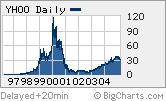 |
| Yahoo!, which was incorporated in 1995 and went public a year later, has seen some ups and downs during the past decade. |
|
|
|
|
|
NEW YORK (CNN/Money) � Take a moment and think. In its young life the Internet has banished more than a few once popular search engines to virtual obscurity, Altavista, Excite, Lycos, Go.com, Snap, the list goes on.
But Yahoo!, which is on the verge of celebrating its 10th birthday, is arguably as strong, if not stronger, than it was during the dot-com bubble days. That's truly remarkable.
To commemorate the event, Yahoo! (Research) co-founder Jerry Yang took a look back at the company's first ten years during a keynote address at the Search Engine Strategies conference in New York Tuesday morning. There was even a birthday cake.
Yang told a packed audience at a ballroom in the New York Hilton that the biggest surprise of the past decade is how quickly the online search based advertising market has taken off following the tech stock implosion of 2000.
To that end, he joked that three years ago he never would have guessed that so many people would show up to a conference devoted solely to search.
Living la vida local
During a question and answer session with moderator Danny Sullivan, the editor of influential search engine research site SearchEngineWatch.com, Yang spoke about several of Yahoo!'s newest product offerings such as Y!Q, which allows users to do a contextual search on a block of text on any Web page, and its desktop search tool, which is currently in beta testing.
Yang added that Yahoo!'s new local search service, which is essentially a souped up Internet version of phone companies' Yellow Pages that includes features like interactive maps and real-time traffic updates, is "one of the better products we've launched in a long time."
Going forward, Yang said he saw many opportunities for the company to expand in the world of blogging as well as providing more content for users of broadband wireless devices.
He also said that the key challenge for Yahoo! and all search companies going forward will be to find ways to increased the personalization of results, i.e. making sure that a user truly finds what he or she is looking for when typing in a keyword search.
"The relevance of search is still the Holy Grail for any search application," Yang said.
More price wars ahead?
Yang and Sullivan talked broadly about how competitive the search market landscape is. But notably absent from this discussion was any mention to Yahoo!'s two chief rivals, Google (Research) and Microsoft's MSN.
Google, which went public last year, is acknowledged by many as the main reason for Wall Street's rejuvenated interest in search since the company is highly profitable. And software giant Microsoft (Research) has recently launched an aggressive marketing campaign for its revamped search tool.
In fact, shares of Yahoo! and other search engine companies have taken a hit recently on concerns about increased pricing pressure and the impact that this will have on the industry's growth.
And this pressure is likely to intensify, especially in the local search market. Amazon.com (Research) recently launched a feature on its A9 search engine that gives users the ability to look at photographs of locations that they are searching for. And AOL, which like CNN/Money is owned by Time Warner (Research), also recently unveiled its own local product.
"Over the long-term, competition in search should increase," said Greg Sterling, an analyst with the Kelsey Group, an independent research and consulting firm that focuses on search. "Growth is still impressive but it's moderating."
So for Yahoo!, the next ten years will likely be as dynamic as the first ten. And the big challenge will no longer be the need to prove that search is a viable market but that Yahoo! will be able remain on top of an industry that gets more competitive by the day.
CNN/Money and CNN.com have a business relationship with Yahoo!
The reporter of this story owns shares of Time Warner through his company's 401(k) plan.

|